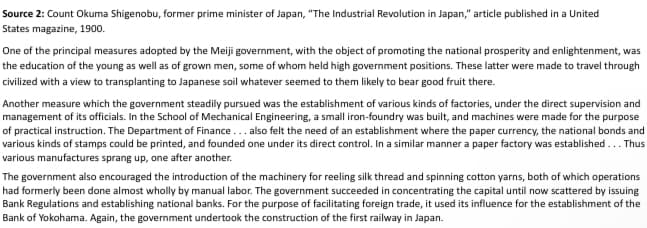Based on source 1, what are the characteristics on Industrlalization in Japan or Russia? Based on source 2, what characteristics on Industrlalization in Japan or Russia?
Based on source 1, what are the characteristics on Industrlalization in Japan or Russia? Based on source 2, what characteristics on Industrlalization in Japan or Russia?
Related questions
Question
Based on source 1, what are the characteristics on Industrlalization in Japan or Russia?
Based on source 2, what characteristics on Industrlalization in Japan or Russia?

Transcribed Image Text:Source 2: Count Okuma Shigenobu, former prime minister of Japan, "The Industrial Revolution in Japan," article published in a United
States magazine, 1900.
One of the principal measures adopted by the Meiji government, with the object of promoting the national prosperity and enlightenment, was
the education of the young as well as of grown men, some of whom held high government positions. These latter were made to travel through
civilized with a view to transplanting to Japanese soil whatever seemed to them likely to bear good fruit there.
Another measure which the government steadily pursued was the establishment of various kinds of factories, under the direct supervision and
management of its officials. In the School of Mechanical Engineering, a small iron-foundry was built, and machines were made for the purpose
of practical instruction. The Department of Finance... also felt the need of an establishment where the paper currency, the national bonds and
various kinds of stamps could be printed, and founded one under its direct control. In a similar manner a paper factory was established... Thus
various manufactures sprang up, one after another.
The government also encouraged the introduction of the machinery for reeling silk thread and spinning cotton yarns, both of which operations
had formerly been done almost wholly by manual labor. The government succeeded in concentrating the capital until now scattered by issuing
Bank Regulations and establishing national banks. For the purpose of facilitating foreign trade, it used its influence for the establishment of the
Bank of Yokohama. Again, the government undertook the construction of the first railway in Japan.

Transcribed Image Text:Source 1: Sergey Witte, Russian finance minister, secret letter to Tsar Nicholas II, 1899.
The gradual growth of industry in the country, always accompanied by falling prices for manufactured goods, will make it possible for our export
trade to deal not only in raw materials, as at present, but also in industrial goods. Our present losses in the European trade can then be
converted into profits in the Asiatic trade.
The influx of foreign capital is, in my considered opinion, the sole means by which our industry can speedily furnish our country with
abundant and cheap goods. Each new wave of capital, swept in from abroad, knocks down the high level of profits to which our monopolistic
entrepreneurs are accustomed and forces them to seek compensation in technical improvements, which, in turn, will lead to price reductions.
If we carry our commercial and industrial system, begun in the reign of Alexander III, consistently to the end, then Russia will at last come of age
economically. Then her prosperity, her trade and finance, will be based on two reliable pillars, agriculture and industry; and the relations
between them, profitable to both, will be the chief motive power in our economy.
Expert Solution
This question has been solved!
Explore an expertly crafted, step-by-step solution for a thorough understanding of key concepts.
This is a popular solution!
Trending now
This is a popular solution!
Step by step
Solved in 3 steps
